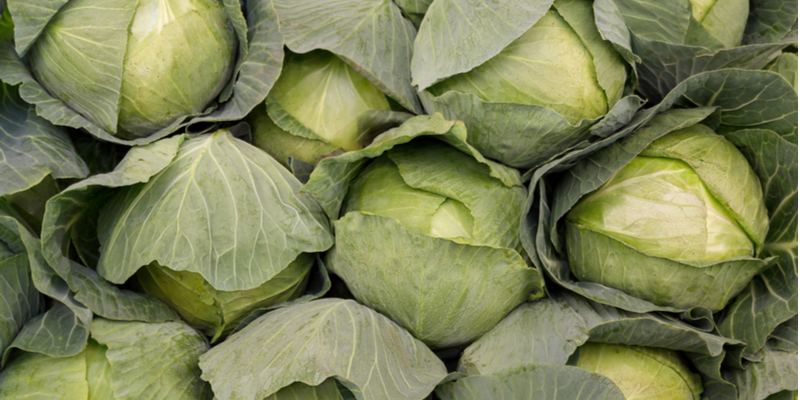September Produce Spotlight: Cabbage
Coleslaw, stir-fry and stew – what could they have in common? Well, they all usually contain cabbage. In this post, we shine a spotlight on cabbage and discuss some of the health benefits one should take advantage of by eating this often neglected vegetable.
Cabbages are usually round in shape and composed of superimposed leaf layers. It’s classed as a cruciferous vegetable, which are vegetables of the family Brassicaceae (also called Cruciferae) with many species used for food production such as cauliflower, kale, garden cress, bok choy, broccoli, Brussels sprouts and similar green leaf vegetables.
Because the vegetable’s inner leaves are protected from the sunlight by the surrounding leaves, it’s colour is usually lighter on the inside. However, the outer colour of the leaves is still the most common way of dividing the vegetable into types. The two basic colour types are green and red.
Cancer Prevention
- Cabbage contains a cancer-fighting compound called sulforaphane. It is a sulfur-rich compound that has been shown to have anticancer properties in a number of test-tube and animal studies, reducing both the size and number of various types of cancer cells.
- It also has a rare compound called 3,3′-diindolylmethane (DIM), which has been shown to counteract some of the negative effects associated with radiation therapy. It helps in ensuring that the red and white blood cells and the platelet count remain existent.
- Another study, conducted at the University of Missouri, looked at another chemical found in this vegetable as well as parsley, and celery, called apigenin – it was found to decrease tumour size when cells from an aggressive form of breast cancer were implanted in mice. Researchers claim that their findings show that apigenin has the potential to be used as a non-toxic treatment for cancer in the future.
- According to Nutrition Australia, red cabbage is even better in cancer prevention. It contains 36 properties that are anti-cancer factors such as anthocyanins.
Heart Health
- A recent report in the American Journal of Clinical Nutrition associated with the intake of flavonoid-rich foods with a lower risk of death from cardiovascular disease and stated that even small amounts of flavonoid-rich foods might be beneficial.
- The high polyphenol content might also reduce the risk of cardiovascular disease by preventing platelet buildup and reducing blood pressure.
Immunity & digestion
- When eaten in its fermented forms such as sauerkraut and kimchi, cabbage is packed full of probiotics. Fermented foods might be one of the best things you can consume for your immune and digestive systems. Healthy microbes generate an acidic environment to preserve and develop flavour; the enzymes produced in fermentation make vitamins and minerals easier to absorb. The fibre and water content also help to prevent constipation and maintain a healthy digestive tract. Eating adequate fibre promotes regularity, which is crucial for the excretion of toxins through the bile and stool.
How to select and store cabbage
Choose one that is firm and dense with shiny, crisp, colourful leaves and free of cracks, bruises, and blemishes – as you would when selecting most vegetables or fruit. Also, choose one that is heavy for its size, as it means its got tightly packed and healthy leaves.
You can store most cabbages in the fridge for about 2 weeks. Once cut, wrap the cabbage in airtight wrap and store it in the fridge for 2-5 days.
Try something different
There are many different types of cabbages – like green cabbage, red cabbage, savoy, and wombok – and you can eat it in many different ways, such as raw, steamed, boiled, roasted, sautéed, or stuffed.
While green cabbage is the more well-known type, try adding red cabbage to your diet. The vibrant red colour of red cabbage means that it contains anthocyanin polyphenols, which contains unique antioxidant and anti-inflammatory properties.
Check out these recipes:
